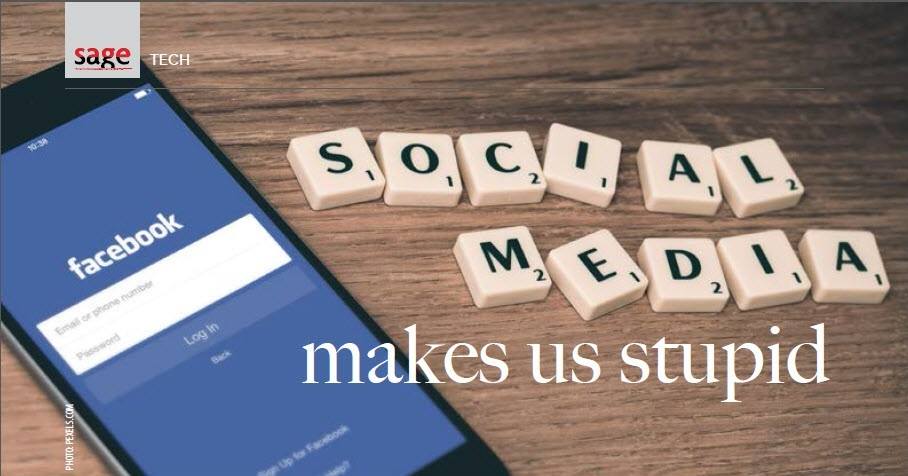
This article first appeared on my Sage Magazine column in the February 2017 Issue
Right before the US elections last year, many opinion polls had been carried out and each showed Hillary Clinton winning with a landslide. Donald Trump was surely a bimbo no one was ready to allow in to the White House.
Well of course Clinton won the popular vote. But the margin wasn’t what had been predicted by pollsters. Plus, she didn’t win the electoral vote. And that’s how the Donald became President.
Some have argued that it is the pollsters who carried out wrong sampling. Some have blamed fake news and propaganda that was being spread. Some have other ideas. But I believe it is just simple: social media.
With the advancement of technology, everyone with a smartphone can access anything they want. From breaking news, opinion articles, entertainment content etc. And one can quickly agree with Don Miller that, “In the age of information, ignorance is a choice”. That is, if you are ignorant about something it is your fault.
But social media does something to us that we may never have recognised.
You are living in your own world. Everything you see or interact with is thoroughly censored by yourself
Think about it. You are on all the major platforms: Twitter, Facebook and Instagram. On Instagram you follow your friends and some celebrities you know. Occasionally you go around checking what other people you may know have posted. On Twitter, unless you are a Follow-Train person or one of the weird pseudo accounts, you always follow the people who you know or the media houses or journalists you identify with. On Facebook, you accept friend requests from people you know, and like pages based on your interests and the interests of your circle of friends.
What do you see from all these?
I see a bubble. Basically, you are living in your own world. Everything you see or interact with is thoroughly censored by yourself. You only get news from particular news sites. You only read opinions from particular writers or media houses. You only know what’s happening to a particular set of celebrities you are interested in. You have, to put this in better words, created a world of your own.
See this, Twitter is the leading breaking news social media site. But not everyone on Twitter knows what’s going on. There are different groups on Twitter. Kind of like dimensions. Log in to someone’s dimension and follow what they follow online and you’ll be in a whole different reality.
Same for Facebook. Where it is even worse. You can like all the pages that are there on Facebook, and if possible follow every single account on the site. But this won’t help you widen your view. Why? Facebook has an algorithm trained timeline. One that learns what you like and feeds that to you. It bases this on things like what you like, what you spend most of your time interacting with, and what the friends you interact most with like. Meaning what you see on Facebook is what Facebook thinks you like, and what if shown will make you stay hooked to the site.
Before the Kenyan general elections in 2013, an outsider would be forgiven to think that Peter Kenneth would be the next President of Kenya. He had a massive following online. And his strategies were worthy of acclamation. But he didn’t. And there are many who had lived in the bubble of the thought of him winning, I would like to think he himself included, that were shocked when he didn’t.
A better example would be the argument against fake news, and how it influenced the US elections.
Many people changed their minds about Hillary Clinton because of her email issues. And there are many who up to date, even after all the investigations, still believe great lies peddled against her by blogs and scam websites.
Human beings of this era are just too lazy to read a whole post. A title is enough
How these blogs and websites get traction is simple. You write a huge lie with an exciting title. Post this on a Facebook page or Twitter handle with a big following. The huge audiences who like this page or follow this handle mostly share a common interest and they will read and re-share this fake post with their friends, in the process changing their mindsets too.
The human beings of this era are just too lazy to read a whole post. The title is enough. Many check out the title and a few sentences and believe whatever is written. Still, there are many who believe that anything online is the truth.
The Borowitz Report, a satirical column on The New Yorker, over the past few months has been forced to label all the pieces by Andy as Fake News to help people not believe what had been posted and instead take it as the Satire column it is. Why? The bubble created by social media makes it impossible for the people who see the commonly trending report to disprove it, or read through it to discover that it is satire.
Fighting the bubble social media places on you takes effort. One has to strive to read more and question the sources of whatever has been shared. One has to not only sit down and believe the opinions shared by individuals they can trust, but also be open to criticism and debate. Learning and unlearning constantly fight the bubble.
It is 2017 and the country is filled with thoughts and discussions on matters elections. It is during periods like this, where politicians thrive by peddling lies. They use opinion blogs and websites, they use leaflets, they use Social Media. Long WhatsApp texts. Anything at their disposal is a tool for their election or re-election bid. And a lot of lies will not only be spread, but they’ll also be believed.
One has to strive to read more and question the sources of whatever has been shared
Fighting these lies takes a concerted effort by everyone who notices them.
You see something that’s not true, you don’t forward it. You don’t laugh at it. You don’t like it. You leave it. You tell the source that that’s a lie. You become ready to fight ignorance.
But fighting ignorance isn’t easy. Think about this: have you ever noticed when you present people with a truth that contradicts their deepest held beliefs, they will not change their mind and believe the facts you present? Well, it is impossible. The person will tell you you’re lying and fight hook and crook and hold on to their original belief even in the face of unbeatable truth.
The same happens with social media. Once a group of people who share a common interest believe something, getting them to change their mind will be impossible.
To fight the ignorance around the bubbles around us especially this year, we need patience and tactic. Listen and respectfully acknowledge the opinions the person or group of people hold. Don’t be emotional in any exchange and concentrate your effort in discussing and not attacking them.
Fighting ignorance isn’t easy
Donald Trump supporters grew more charged up and inspired in the run up to last year’s election because of how the media and the Democrats treated them. Instead of being ready to discuss and share and respect their opinions, people were instead bashing them, abusing them, and insinuating that they were fools who couldn’t make decisions. This inspired them and gave them a resolve. It didn’t change their minds.
Also read something I wrote for iAfrikan:
We May Be The Most Informed Generation In History, But A New Age Of Deliberate Ignorance Is Upon Us



I cut off most of my online “friends” unliked several useless pages and decided to seek out information when I need it. GIGO truly.